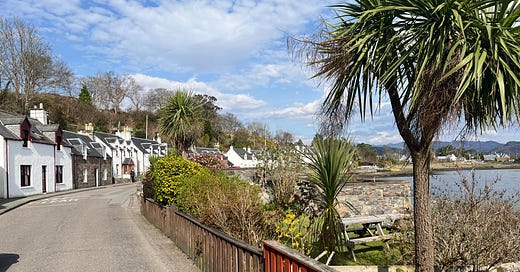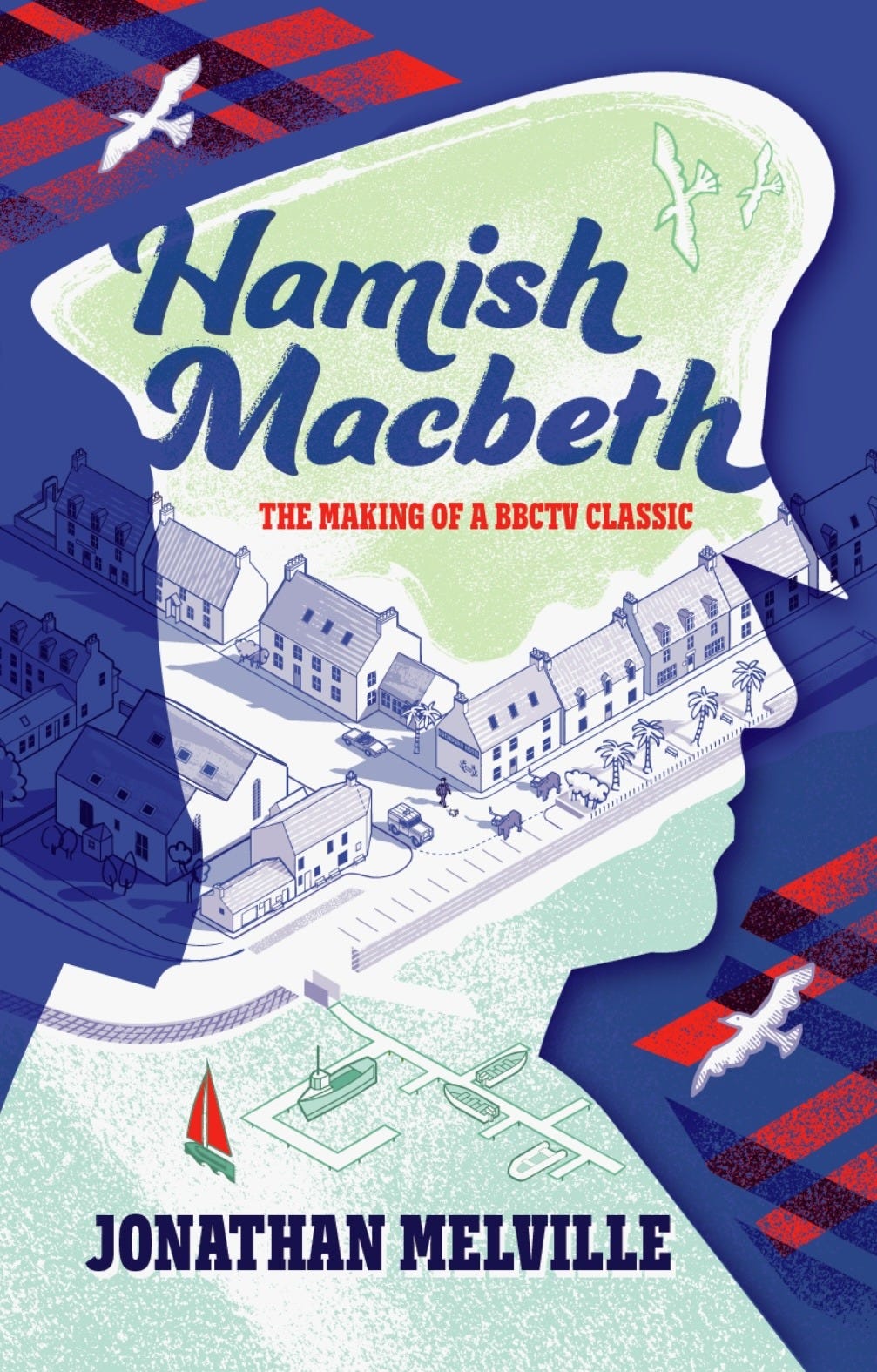In the mid-1990s, TV’s view of Scotland rarely seemed to stray far from the mean streets of Glasgow. When Jim Taggart growled ‘There’s been a murder’ or Rab C. Nesbitt philosophised from the streets of Govan, they reinforced an image of urban Scotland that dominated the nation’s screen identity.
The Highlands, when they appeared at all, seemed to exist in a parallel universe, a place of misty glens and shortbread tin romanticism.
But on 26th March 1995, BBC One viewers encountered something different in Hamish Macbeth. The series followed the adventures of its eponymous Highland police constable, played by Robert Carlyle, in the fictional village of Lochdubh for 20 episodes across three series.
Filmed in the picturesque coastal village of Plockton, the series blended crime, comedy and romance while building an ensemble cast of memorable characters. Though loosely based on author M.C. Beaton’s novels, the show carved its own distinctive path under writer Daniel Boyle.
Hamish Macbeth stood out from other so-called ‘cosy’ Sunday night dramas such as All Creatures Great & Small (1978-90) or The Darling Buds of May (1991-93). Seconds into its first episode, Hamish oversaw a poaching expedition by his friend TV John McIver, before kicking in a car’s headlight and smoking a joint with the local doctor. It was a show that felt unmistakably Scottish, yet its appeal was universal.
Cosy Sunday night TV? Not exactly…
So begins the introduction to my new book, Hamish Macbeth: The Making of a BBC TV Classic, which was published today on the 30th anniversary of that first episode’s broadcast on BBC One.
I remember setting my VHS to record ‘The Great Lochdubh Salt Robbery’ having heard that actor Jimmy Yuill was in it, a local lad done good from the village of Golspie, where I spent much of my early life. Seeing the north of Scotland in a TV drama was a rare sight in 1995 and remains so today.
I watched (and recorded!) all 20 episodes and have been mildly obsessed with the series ever since. I started interviewing members of the cast in around 2007 as they passed through Edinburgh theatres, also tracking down some of the creatives behind the camera, including lead writer Daniel Boyle (not the Trainspotting one). I also spoke to Plockton residents who remember filming taking place in their village and there are around 45 people quoted in the book from those various conversations… in fact here’s the full list:
Cast (Alphabetical by Surname)
David Ashton – Major Roddy Maclean
Tam Dean Burn – Black Bob Roberts
Jimmy Chisholm – Tartan Salesman/Christie McMurray
Stuart Davids – Lachlan McCrae Jr
Ron Donachie – Zoot McPherrin
Duncan Duff – Doc Brown
Valerie Gogan – Alex Maclean
Shirley Henderson – Isobel Sutherland
Philip Jackson – Malachi McBean
Phyllida Law – Vicky Jeffreys
Edith MacArthur – Belle Carter
Michael Mackenzie – Ferdinand McLopez
Alasdair MacQuarrie – Danny MacLellan
Forbes Masson – Tam Flood
Stuart McGugan – Barney Meldrum
Brian Pettifer – Rory Campbell
Barbara Rafferty – Agnes Meldrum
Ralph Riach – TV John McIver
Dallas Young – Houston Old
Jimmy Yuill – Lachlan McCrae Sr (Series One)
Crew and residents
Daniel Boyle – Writer
Sarah Bruce – Stand-In and Runner
Andrea Calderwood – Head of Drama, BBC Scotland 1994–97
Dougie Craig – Plockton resident
Julia Duff – Casting Director
Bryan Elsley – Writer
Colin Finlay – Local resident
Mandie Fletcher – Director
James Fraser – ex-Kyle of Lochalsh resident
Jonas Grimås – Director
Toby Hefferman – Third Assistant Director
Stuart Hepburn – Writer/Actor
Ming Ho – Script Editor
Deirdre Keir – Producer (Series One and Two)
Ian Knox – Director
John Lunn – Composer
Calum Mackenzie – Plockton resident
Charlie MacRae – Plockton resident
Scott Meek – Executive Producer
Dominic Minghella – Script Editor and Writer
Donald Murdoch – Musician
Jon Older – First Assistant Director
Nicholas Renton – Director
Charles Salmon – Producer (Series Three)
Mike Shucksmith (Chairman, Balmacara Community Trust)
Robert Carlyle declined an invitation to be involved, telling me ‘I don’t like looking back’ after a talk at the Edinburgh International Film Festival. Thankfully Robert is discussed throughout the book by the people he worked with, while there are dozens of archive interviews with the actor that I’ve referenced.
Hopefully I’ve done justice to everyone involved in the series and to Plockton, it’s meant to be a love letter to the series and to a time when Scottish television felt like it could do anything.
If you’re reading this newsletter and have bought one of my previous books then I think this one is for you. OK, I would say that, but the tone of Hamish Macbeth was inspired by series such as Maverick, Northern Exposure and The X-Files, plus there are elements of Local Hero in there and even Tremors (there’s something about small towns in film and TV that gets me every time), so if you like any of those you might find this is a good primer for your first viewing of the series.
The book is currently available to order via Amazon in print and ebook internationally, with other stores following in the next few days and weeks. I appreciate that not everyone feels they can justify buying from Amazon, but as an indie publisher it has to be the first option for me, and I actually make a pound or two more than with other options, but don’t let that sway you!
If you’re in the UK then check the series out on BBC iPlayer right now, I think it’s on on Prime Video in other countries.
Please let me know what you think of the book if you do buy it, and please try to leave a review somewhere or post a photo on social media, every little bit helps!
I’m now moving on to my next book, Rainbow Connections: Volume One: Meeting the People Who Brought Jim Henson’s Vision to Life, which needs some finishing touches before its release in May or June 2025.





